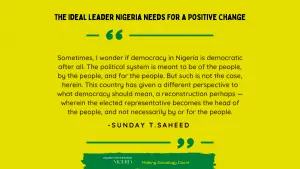I recently came across a tweet on Twitter that said “I remember when I used cloths in place of pads because I didn’t have money and didn’t want to pressure my mum. Now I buy packs without even asking anybody. Omoo, life really changed in a flash. I pray God makes it easy for everyone because using cloth isn’t it at all”
This tweet captures the reality of many Nigerians who lack money for period products, the shame and worry that comes with it, and the ultimate effect it has on education, physical well-being, and mental health. Imagine not being able to go out because of fear of staining your clothes. And the discomfort that comes with using rags, tissues, leaves, or paper. This isn’t only an imagination, it’s the monthly experience of millions of Nigerians who suffer from period poverty. This is why there’s a need to openly discuss period poverty, support various initiatives, and advocate for change.
What is period poverty?
Period poverty means the lack of access to menstrual hygiene products, medications, and education. As well as proper meals that aid the proper flow of blood during menstruation.
For millions of girls and women in Nigeria, menstruation is not just a regular menstrual cycle but a battle for dignity. The constant worry when the date is getting closer due to the inability to afford sanitary products. The stress of having to get changed several times a day because the cloth won’t just absorb all the blood, walking difficulties from stomach pain, and the unavailability of funds for medication. This is a harsh reality for females in Nigeria struggling to make ends meet, it’s particularly worse for those in rural areas who don’t even have proper education on menstrual hygiene.

Poverty as a Root Cause of Period Poverty
As the name “period poverty” implies, the root cause is poverty itself; that is the inability to afford sanitary pads and other menstrual hygiene products. With about 40% of the population having to survive on less than 1,000 naira a day, menstrual products become less of a priority as other needs take priority. It’s unrealistic to expect someone who hasn’t eaten all day to think of using their daily earnings to buy a pad instead of food. This leads to the use of unhygienic alternatives such as dirty clothes, leaves, or even random papers. All of which leads to short-term discomfort and the possibility of long-term infections.
Another issue that poses a challenge to underprivileged females is the lack of clean water and sanitation facilities which makes it very difficult to get by. Lack of access to these basic needs makes it difficult to clean up after staining or shower thrice a day.
Effects of Period Poverty
- Absenteeism: Lack of access to period products, coupled with the lack of basic facilities such as a proper toilet to clean up, often causes menstruating females, especially those with a heavy flow to miss classes or work due to fear of staining their uniforms or dresses. This ultimately affects their academic performance and overall educational progress.
- Infections: The use of good sanitary products such as pads, tampons, and menstrual cups is essential during menstruation. Access to clean water for fresh bathing is also an essential menstrual hygiene. Sadly, some women do not have access to this luxury. They then result in the use of clothes, papers, leaves, and dirty water. This unhygienic practice may lead to bumps on the private part, itching, rashes, or bad odor. In severe cases, it may result in yeast infections, urinary tract infections, or reproductive infections.
- Mental effects: Period poverty significantly affects the mental well-being of females. It undermines their self-esteem and they end up fighting an inner battle. The fear and hatred of period gradually build up and they may feel constantly defeated and helpless whenever their period comes and they can’t afford the basic sanitary products. In severe cases, it may result in depression and the pervasive feeling of injustice. The trauma experienced by young girls forced to miss classes and isolate themselves indoors to avoid staining their clothes may be profound and often underestimated.
Possible solutions
- Government intervention: The Government can help alleviate period poverty by implementing free monthly supplies of period care packages for underprivileged women, fixing toilets, and providing water in rural areas. Establishing a specialized task force dedicated to ending period poverty through negotiations with manufacturers and retailers to subsidize period packages. Additionally, the formulation of new laws regulating working policies for women and mothers with female kids is a great step toward solving the problem of period poverty.
- Education: Educational programmes on menstrual hygiene specifically for rural areas and communities with a large number of uneducated females should be introduced and done annually. Menstrual Myths should be addressed and hygienic practices should be reinforced. The Do’s and Don’ts such as what meals to eat, and what meals should be avoided during menstruation should be taught.
- NGOs and charitable organizations should be provided with proper funding to enable them to work efficiently. They should focus on enlightenment, providing period products, and campaigning against period stigmatization. They can also collaborate with brands that produce period products to donate to communities and encourage the production of reusable menstrual products like washable pads and menstrual cups.
Individuals who are willing to help may consider viable options such as
- Choosing menstrual products from brands that are actively helping the cause of ending period poverty
- Donating period products or money to NGOS
- Working as volunteers for various enlightenment programs.
In Nigeria where period poverty is rampant, we can make a difference by promoting awareness, donating to the cause and actively participating in campaigns to enforce laws that end period poverty. Together, we can empower women and encourage a healthy menstruation.






